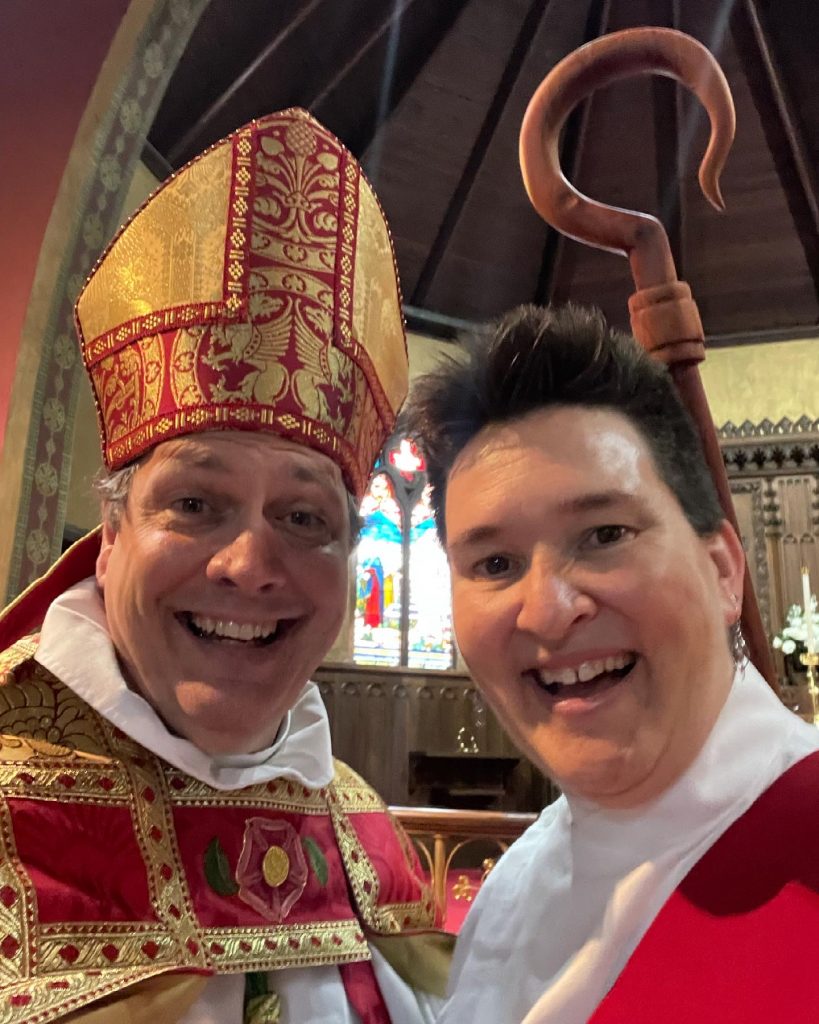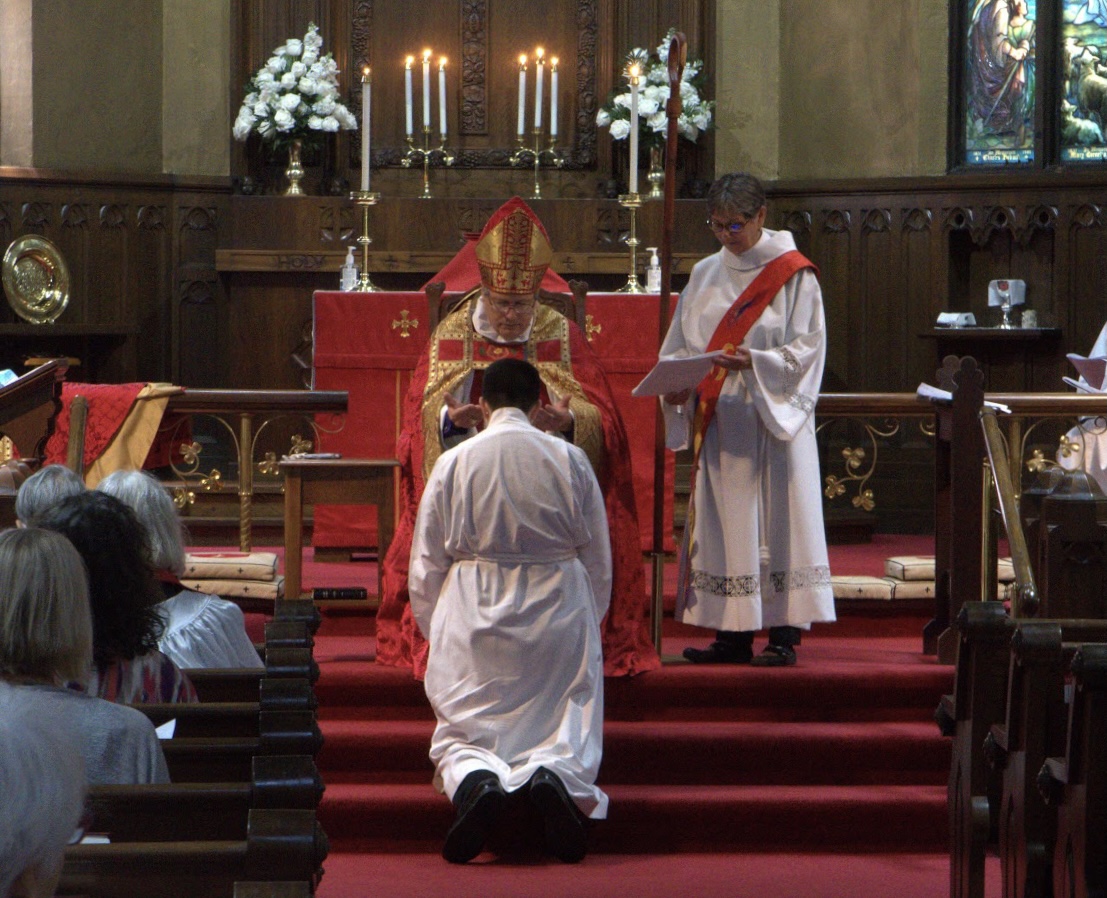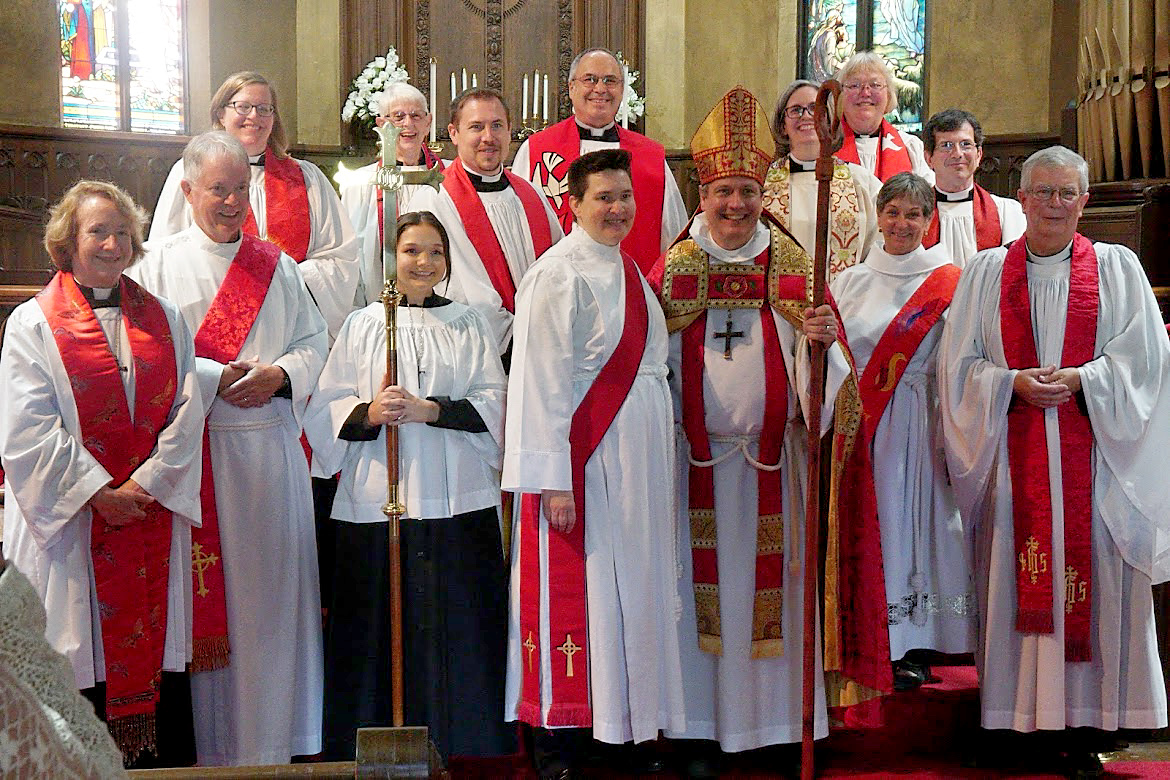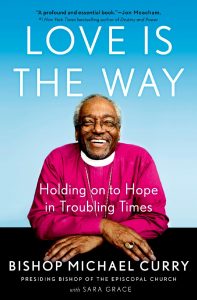Bishop’s Address to the 200th Convention
November 5, 2021 – Jekyll Island Convention Center
Beloved in Christ,
I am overjoyed to gather with so many of us in person for this convention of the Episcopal Diocese of Georgia. Since being ordained as your bishop 1 year, 5 months, and 7 days ago, I have longed for just such a meeting, time to gather as a community to see one another face to face and not just our smiling eyes. This evening at Honey Creek, while we will mask for the Eucharist itself, we will also have time outdoors to be together. If this pandemic has taught us anything, it has underscored the need all of us have for community. We may need face time with others to varying degrees, but we all long to be with others and so I am so very pleased that while some are with us online, more than 200 of us are in person at the convention center and will be at our retreat center.
My charge by the canons of our church is to share the state of the diocese with you in this address, including the work undertaken since our last convention and plans for the coming year.
Since we last met in convention online, we have had much to mourn. More lay leaders, deacons, and priests have died since our last convention than in any year of the past 20 in which I served as a priest. And our usual rituals of grief have been reduced or delayed so that Bishop Henry Louttit’s funeral in the last week of this year will fall just shy of year since he died. This evening, in our Holy Eucharist for this convention, we will name those who have died in this past year and pray for them and for all of us who grieve. You may add names to those we will remember this evening by adding them to the list on a table by registration.
It is our faith in Jesus Christ that has bound us together for 198 years and continues to draw us together even as the pandemic has made that difficult. And with the pressure of trying to return some normalcy while at the same time mitigating risk of spreading the SARS-COV-2 virus that causes COVID-19, tempers seem shorter and an angry response seems easier. Mask and vaccination mandates have sparked anger as have incidents of and debates over racial violence.
Yet we have an excellent example of finding unity in a divisive time with the interfaith clergy of Glynn County. The eyes of the nation are watching the trial of three men accused of killing Ahmaud Arbery, whose death recorded on video by one of the accused received national and international attention as Ahmaud’s killing was soon linked with the deaths of Breonna Taylor and George Floyd. Protests around the country and the world followed as many called for a racial reckoning in response to ongoing anti-black violence, while others said Ahmaud’s death had nothing to do with his being black. In fact, the main issue we face in addressing racism in our midst is that we can’t even agree on what racism is when we see it.
Yet we do what we can to take the next step together. Through a grant from the Episcopal Church, the Diocese of Georgia contributed significantly to fund the work the clergy of Glynn County have done in the past year to come to speak with one voice as a non-anxious presence calling for peace and unity as the jury is empaneled and works toward a decision that reflects God’s justice.
This is just part of our work, and I am grateful for Racial Justice Georgia, the group leading our racial healing ministries and I support them as we focus on Becoming Beloved Community as part of how we are the Body of Christ in our unique settings. Supported by the same grant from the Episcopal Church, the Rev. Guillermo Arboleda is also working on education and advocacy. He is particularly educating clergy and lay leaders in how to engage helpfully and constructively with law enforcement officers, on whom we depend, as they seek to serve while contending with policies that have too much of society’s woes on their plates.
I was raised sensitive to people naming anything as an issue of race, convinced people named a problem as racism too readily. I was defensive as I did not want to see me or my family as bad. Yet it doesn’t take an evil person to do an evil act. In time, I have seen the deep wisdom Maya Angelou expresses, “Do the best you can until you know better. Then when you know better, do better.”
Yet this is far from a new undertaking for our Diocese, and we are driven not by the media or a political agenda, but by our faith in Jesus. These current expressions of ongoing efforts continue the work Bishop Benhase began in racial healing, which itself continues in the same call Bishop Albert Rhett Stuart offered in the 1960s, as he helped this diocese navigate ending segregation. Our conviction is based in scripture. Genesis proclaims that every person on the planet was created in the image and likeness of God and our baptismal covenant commits us to “strive for justice and peace among all people, and respect the dignity of every human being.”
This pandemic has stretched on longer than I imagined possible when on March 13, 2020, Bishop Scott Benhase suspended gathering in person for worship for the next 14 days in the congregations of the diocese. Spoiler alert: suspending in person gathering lasted longer than two weeks.
Victoria and I did continue traveling around the Diocese to record worship, which we offered online through Pentecost Sunday this year. We ended up offering worship online from 58 congregations of the Diocese of Georgia having begun that work in Pentecost 2020. Victoria and I were the entire film crew, and toward the end of this period our typical pattern was to record worship in two locations in the same day, then drop off the files with our Communications Manager Liz Williams, who assembled the final video, working with Canon Joshua Varner who oversaw the music for online worship, working with musicians, choirs, and singers, including a diocesan staff quartet, who beyond their work days for the Diocese offered their considerable gifts for singing. I am deeply grateful to Victoria who is the hardest working roadie in the Episcopal Church. She helps me stay grounded and closer to humble than I would be without her and she proved an ever patient partner when we were recording worship.
This past year has also offered windows of opportunity for in person worship and fellowship. As vaccinations permitted more in person worship and events, I have been pleased to see the creative ways you have found to be together.
From Backyard Eucharists and Mass on the grass to liturgies under a tent on the church lawn and so many other creative ways of being together outdoors showed your faithfulness and creativity.
At the diocesan level: Canon Joshua Varner did an exemplary job at taking the window offered by the vaccine and then-falling cases of COVID to creatively put together three sessions of Family Camp at Honey Creek. He had all the elements we associate with camp from silly songs and games to craft time and meaningful worship. Then in September, 55 deacons and priests gathered at Honey Creek for a clergy conference with the usual means of mitigating risk provided a chance to be with each other and to experience yet again the close bonds we share.
The work of this Diocese is primarily the worship, prayer, and work of our congregations, and as your bishop, my staff and I primarily spend our days supporting our churches. Canon Katie Easterlin has been on the road this year to assist in some unusual situations where her expertise was vital to handling a congregation’s finances. Canon Loren Lasch has been all around our territory for many in person meetings with vestries and search committees.
In speaking to the State of the Diocese, we know that the ways we worship and serve Jesus are mostly through our 69 congregations. And while we are doing better than we feared we might when sheltering in place began, no church in the Diocese is back to typical attendance. Two thirds of our congregations report that their income is better, about the same, or only slightly less than in previous years, but that means a third of us have been hit harder. We are doing pretty well, but as the Body of Christ, when any are hurting, it affects us all.
As your Bishop, my staff and I used the tools available to us to assist those congregations on the edge. The Church Pension Group allowed us to put forward a small number of clergy whose congregations would not have to pay pension assessments for up to four months while still accruing full benefits, and Canon Easterlin and I applied for and got that relief. When a $40,000 grant to diocesan operations from the Episcopal Church that went out to each diocese arrived, we saw that the money was not needed to balance our diocesan budget. Instead, we created a pandemic grant process and assisted 20 congregations with some smaller needs. Diocesan Council also approved new appeals to the Diocesan assessment in addition to previous multi-year appeals. These are typically granted to congregations experiencing significant drops in income, sometimes due to unexpected expenses caused by an issue with a building.
Even with the constraints of the pandemic, we have begun much of the work I pledged to address in the meetings leading up to my election as your bishop. While things have been going well, we know the routine review is needed to keep us on track. I worked with Diocesan Council to create Task Groups to thoroughly review our Canons and to take an end-to-end look at our process of discerning a call to ordination. The first of those groups have already been presented to convention, and the second is resulting in significant changes to improve our discernment process and how we prepare people for ordination. Everything is on the table in this work and the Task Group is doing the prayerful consideration we need to get this right. I have also appointed the Rev. Jim Said to chair a third Task Group in order to take a fresh look at our companion diocese relationship. We have benefitted so much from our work first in Guyana and then Belize and in recent years with the Diocese of the Dominican Republic. I know that discerning anew, even if it results in staying with the same companion, will assist us in that effort. I will also be naming a Commission on Worship, as found in our canons, both current and proposed. Putting the right people together to serve on our behalf, we are seeking to improve our diocesan ministries.
Recently, I ran across an indicator showing how far we have come in the Diocese of Georgia. As we will at this convention look at significant canonical revision, I was asked about when this had been done previously. Recalling work in the late 1960s, I went to convention journals and found what I was looking for and, in the process, a description of the Diocese of Georgia when few if any here saw us as a community or family. In 1968, the 146th Annual Convention met at St. Paul’s Church in Albany, Georgia. That meeting received a report from a 2-year long study of the Diocese of Georgia, which stated:
“We are operating on the principle of a loose (very loose, much of the time) confederation of some 23 separate, independent ‘parish’ congregations, plus 39 separate ‘mission’ congregations, dependent on the Bishop. There is little or no sense of ‘kinship,’ of belonging to one another, much less to a wider fellowship. Cooperation between parishes, or between parishes and missions, even in the population centers, is almost nonexistent.”
I was astounded by this statement. I know that many who attend our churches are unfamiliar with the details of the Diocese in which they are grafted into The Episcopal Church and the Anglican Communion. Yet, I do see how all of our deacons and priests and our most involved lay leaders experience a sense of community with mutual respect that I find to be a real strength for us.
I look back to the convention in 2018 and see such a profound difference in our diocese 50 years after that report. At that 2018 meeting, we considered how best to deal with the debt owed on non-secured bonds issued in 2011 to restructure $1.25 million of debt associated with the operation of Honey Creek. We were just short of unanimous and had a very strong consensus that we would all take on an additional 2% of assessment for not more than three years to clear that debt that had predated Bishop Benhase. Despite being in pandemic, we passed the halfway point of that plan at the end of the second quarter this year and we in fact had half of the funds in hand, just as planned. We are on track to eliminate that long-standing debt, because we worked together as a Diocese rather than as disconnected congregations.
Some present will have missed those earlier debates, so I will provide context. The unsecured debt was not a debt of Honey Creek alone but a debt owed by the Diocese because our Retreat Center is not a separate entity. That debt, however we looked at it, was against the operations of the Diocese. And in issuing bonds to restructure that debt, our responsibility to honor that commitment was absolute.
A note of caution is in order. The first half of our bond debt was a little easier to raise, as we had generous givers who were in a position to forgive their bonds, and we had built up some reserves toward the debt. Yet the end is in sight for this plan.
This week, Canon Katie Easterlin and our Assistant Administrator, Daniel Garrick, sent checks to every bondholder paying off the bonds in full. To do this, the Finance Committee approved a short-term loan that will be paid off as the additional 2% assessment continues to come in through the end of 2022. If every congregation could pay their assessment in full, the plan we approved in 2018 would work. But some of our churches are struggling and have appeals on their assessments that are approved by Diocesan Council. This is why, starting with my first day as Bishop, I worked with the Finance Committee and Diocesan Council to adjust the diocesan budget so that the Diocese as a whole also contributes 2% of its budget to the debt. This has us closer to our goal. If we all stay the course, we can and will fully eliminate all debt on our Retreat Center by the end of next year. But no matter what, the special 2% assessment will end after the coming budget year, and we will go back to 10% as the full assessment. If some small debt remains, we will pay it off through the diocesan budget, thanks to your faithfulness.
Faithfulness is the key. This evening, in my sermon for the Holy Eucharist on the grounds at Honey Creek, I will pick up this thought and speak to how I see God is leading us in our next step of faithfulness.
For now, I want to offer a refrain that I often used in private responses to someone as Canon to the Ordinary for the previous decade. In being thanked for something I had done or the Diocese had done, I would say truthfully, “I am just glad to be on the team.” Now as your bishop, I am so very grateful for a Diocese where I have seen so many ways you are using the considerable gifts you have been given to serve the needs of your congregations and communities, and in this call, while I am your chief priest and pastor, I find myself still just glad to be on this team.
The Rt. Rev. Frank S. Logue
Bishop of Georgia

 This is not to say that Susan was a stranger to church. Not by a long shot. She was baptized at Christ Episcopal Church in Exeter, New Hampshire about two months after her birth. She stood up for her place in the church at an early age too when the Rector did not understand her wanting to be a shepherd instead of an angel as boys were shepherds and girls were angels. But she was a budding thespian and Susan knew Shepherds get to play fear, which is a way better role. She did prevail and soon after began to acolyte and in a few years was confirmed.
This is not to say that Susan was a stranger to church. Not by a long shot. She was baptized at Christ Episcopal Church in Exeter, New Hampshire about two months after her birth. She stood up for her place in the church at an early age too when the Rector did not understand her wanting to be a shepherd instead of an angel as boys were shepherds and girls were angels. But she was a budding thespian and Susan knew Shepherds get to play fear, which is a way better role. She did prevail and soon after began to acolyte and in a few years was confirmed. Susan listened to God telling her to go to church. She showed up only to find as she would later say, “I hard every single prayer, reading, and hymn, and the entire package was an unmistakable message: “You are loved. You always have been loved. And I will always love you.”
Susan listened to God telling her to go to church. She showed up only to find as she would later say, “I hard every single prayer, reading, and hymn, and the entire package was an unmistakable message: “You are loved. You always have been loved. And I will always love you.” We all know the love of Jesus, the Good Shepherd who leaves the 99 sheep to go after the one that is lost. In our own families, in our workplaces, and among our friends, you and I are already deployed where God needs us to be there for people we already know to play the role that Mother Lee Shafer played in Susan’s life of being the sounding board for that feral cat stage of trying to trust God and God’s church. And in this effort, the real work is that of the Holy Spirit. I see this in how the Spirit was acting in Susan’s life to draw her back in to the Body of Christ. I have experienced this in my own life. And I have seen it in others who God has put in my path, where the Holy Spirit is already with them. We just have to be a part of affirming that message is real: You are loved. You always have been loved. And God will always love you.
We all know the love of Jesus, the Good Shepherd who leaves the 99 sheep to go after the one that is lost. In our own families, in our workplaces, and among our friends, you and I are already deployed where God needs us to be there for people we already know to play the role that Mother Lee Shafer played in Susan’s life of being the sounding board for that feral cat stage of trying to trust God and God’s church. And in this effort, the real work is that of the Holy Spirit. I see this in how the Spirit was acting in Susan’s life to draw her back in to the Body of Christ. I have experienced this in my own life. And I have seen it in others who God has put in my path, where the Holy Spirit is already with them. We just have to be a part of affirming that message is real: You are loved. You always have been loved. And God will always love you. The Diocese will read together Love is the Way by Presiding Bishop Michael Curry as the 2021 1Book1Diocese pick.
The Diocese will read together Love is the Way by Presiding Bishop Michael Curry as the 2021 1Book1Diocese pick.